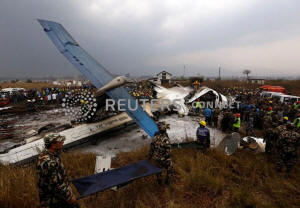|
Pilot had 'emotional breakdown' before
deadly crash, Nepal probe panel says
 Send a link to a friend
Send a link to a friend
 [January 28, 2019]
By Gopal Sharma [January 28, 2019]
By Gopal Sharma
KATHMANDU (Reuters) - The captain of a
Bangladeshi aeroplane "seemed to have an emotional breakdown" before a
deadly crash last March, Nepali investigators said in a final report on
the Himalayan nation's worst aviation disaster in 26 years.
They blamed the crew's loss of situational awareness for the crash of
the US-Bangla Airlines flight to the Nepali capital from Dhaka that
caught fire on landing in Kathmandu, killing 51 of the 71 people aboard.
"The pilot thought he could maneuver the aircraft and land. But he could
not," panel official Buddhisagar Lamichhane, told Reuters on Monday,
referring to the captain.
The captain was under stress and "emotionally disturbed" because he felt
that a female colleague who was not on board the fatal flight had
questioned his reputation as a good instructor, Nepal's Accident
Investigation Commission said in the report.
"This, together with the failure on the part of both the crew to follow
the standard operating procedure at the critical stage of the flight,
contributed to the loss of situational awareness," said the report,
submitted late on Sunday.

This lack of awareness meant the crew did not realize the deviation of
the aircraft, a Bombardier Inc <BBDb.TO> Q400 turboprop, from its
intended path, which in turn meant they could not sight the runway, it
added.
Having missed the runway, the crew was flying very low north of it in an
incorrect position near hilly and mountainous terrain around the
airport, it said.
"Finally, when the crew sighted the runway, they were very low and too
close to (it) and not properly aligned," added the report, saying the
captain should have halted the landing and initiated a go-around.
The plane skidded off the runway on to surrounding grass, quickly
catching fire. Both pilots were among those killed.
US-Bangla Airlines expects to make an official statement later on
Monday, Chief Executive Imran Asif said.
MENTAL HEALTH
The flight's captain, aged 52, was released in 1993 from the Bangladeshi
Air Force because he suffered from depression but was later declared fit
to fly civilian aircraft, the report said, with recent medical reports
mentioning no symptoms.
[to top of second column]
|

Rescue workers work at the wreckage of a US-Bangla airplane after it
crashed at the Tribhuvan International Airport in Kathmandu, Nepal
March 12, 2018. REUTERS/ Navesh Chitrakar

Citing the voice recorder and the eyewitness accounts of passengers,
the report said the captain was smoking in the cockpit during the
flight and "engaged in unnecessary, unprofessional and lengthy
conversation even in the critical phase," violating the norm of
maintaining a sterile cockpit.
He shared the cockpit with a female first officer, 25, who had a
total of just 390 hours of flying experience and had never
previously landed at Kathmandu as crew, the report said,
contradicting a US-Bangla spokesman who last year said she had made
landings there before.
Landing at Kathmandu airport, which is surrounded by hills, is
considered difficult. In 1992, all 167 on board a Pakistan
International Airlines aeroplane were killed when it plowed into a
hill as it tried to land.
On the US-Bangla flight, the disparity in experience and added
authority of the captain probably deterred the first officer from
being more assertive during significant phases such as the final
approach and landing, the report said.
The report recommended that the airline emphasize proper crew
resource management and set up a mechanism to monitor and assess the
mental status of the crew regarding professional development,
financial, personal and psychological issues.
Pilot mental health was spotlighted by a 2015 crash in Europe after
a Germanwings first officer deliberately flew a jet into a
mountainside.
Last year, the European Commission adopted new rules on the mental
health of pilots, for the first time requiring airlines to do a
psychological assessment before hiring them.
(Reporting by Gopal Sharma in Kathmandu; Additional reporting by
Ruma Paul in Dhaka; Editing by Jamie Freed and Clarence Fernandez)
[© 2019 Thomson Reuters. All rights
reserved.]
Copyright 2019 Reuters. All rights reserved. This material may not be published,
broadcast, rewritten or redistributed.
Thompson Reuters is solely responsible for this content.
 |